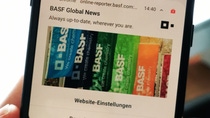Media
Joint news release
Styropor® Ccycled™ for Stressless® packaging: proven material with reduced carbon footprint for high-end design furniture
- First project in Scandinavia: contributing to the sustainability strategy of all companies by using protection packaging based on chemically recycled plastic waste
- High-quality EPS packaging for high-quality design furniture
- Styropor® Ccycled™ offers the same properties as virgin material whilst contributing to reduce the consumption of fossil raw materials
Ludwigshafen, Germany and Vartdal/Ikornnes, Norway, 04 November 2021 – As of November 2021, Ekornes, a Norwegian manufacturer of high-end design furniture uses EPS (expandable polystyrene) protective packaging that has a lower carbon footprint than virgin material by safeguarding the same properties. This is achieved by replacing fossil resources with recycled raw materials at the beginning of production. BASF supplies Styropor® Ccycled™ to VARTDAL PLAST, who converts the material into moulded packaging parts for Stressless® furniture made by Ekornes.
“We are really proud to be the first company to launch this project together with VARTDAL PLAST and BASF with regards to design furniture. We always strive to have the best packaging solution to protect our quality furniture, and Styropor® Ccycled™ offers exactly what we want: same properties as virgin material but at the same time meeting the needs to reduce our carbon footprint, a perfect fit into our sustainability strategy,” says Solveig Gaundal, Compliance and CSR Manager at Ekornes.
Virgin-quality packaging – smaller carbon footprint
Due to its manufacturing process, Styropor® Ccycled™ has the same properties as conventional Styropor®. This maintains the excellent packaging properties such as outstanding impact absorption and high compressive strength, which are essential for the protection of sophisticated design furniture. In the production of the packaging foams that have become so well-known over the last 70 years, pyrolysis oil replaces fossil raw materials. BASF sources this oil from technology partners who use a thermochemical process called pyrolysis to transform post-consumer plastic waste that would otherwise be used for energy recovery or go to landfill into this secondary raw material. BASF then uses the oil at the very beginning of the value chain to manufacture new plastics and other products.
Since recycled and fossil raw materials are mixed in production and cannot be distinguished from each other, the recycled portion is allocated to Styropor® Ccycled™ using a mass balance approach. Both the allocation process and the product itself, have been certified by an independent auditor. Compared with conventional Styropor®, at least 50 percent of CO2 is saved in the production of Styropor® Ccycled™.
Also, for the converter VARTDAL PLAST Styropor® Ccycled™ brings a lot of advantages as the product is identical to virgin material. Therefore, the production process does not have to be adjusted. The company and their products are certified according to the ecoloop certification programme, confirming that for the products 100 % recycled material was used as feedstock. “We are thrilled to be working together with BASF and Ekornes on this project. This is a testament of our mutual commitment towards a more sustainable future,” says Mounir El'Mourabit, product manager at VARTDAL PLAST.
Contributing to the circularity of plastics – conserving resources – protecting the environment
“Current environmental policy focuses on reducing greenhouse gas emissions, conserving fossil resources, and avoiding or using waste. By using products from our ChemCycling™ project, our partner Ekornes is actively contributing to the recovery of plastics after their use phase and feeding them back into the materials loop,” says Klaus Ries, head of BASF’s Styrenics business in Europe.
Read more about BASF’s ChemCycling™ project here.
About BASF
At BASF, we create chemistry for a sustainable future. We combine economic success with environmental protection and social responsibility. More than 110,000 employees in the BASF Group contribute to the success of our customers in nearly all sectors and almost every country in the world. Our portfolio is organized into six segments: Chemicals, Materials, Industrial Solutions, Surface Technologies, Nutrition & Care and Agricultural Solutions. BASF generated sales of €59 billion in 2020. BASF shares are traded on the stock exchange in Frankfurt (BAS) and as American Depositary Receipts (BASFY) in the U.S. Further information at www.basf.com
About Vartdal
VARTDAL PLAST is one of the leading EPS producers in Norway offering a wide range of products for food packaging, industrial packaging and building and construction. For 60 years we have contributed to safe food and warm houses by offering such products. Our goal going forward is to transform all our products from containing fossil raw materials to containing recycled or fossil free raw materials. Further information at www.vartdalplast.no
About Ekornes
Ekornes is the largest furniture producer in Norway and owns the brand names Ekornes®, Stressless®, Svane® and IMG. Stressless® is one of the world’s most well-known furniture brands, while Ekornes®, Stressless® and Svane® are the best known in the Norwegian furniture sector. IMG is best known in Australia and the USA. Production takes place at the Group’s ten factories, five of which are in Norway, one in the USA, one in Thailand, two in Vietnam and one in Lithuania. Ekornes sells its products over large parts of the world, either through its own sales companies or via importers. Further information at www.ekornes.com
| BASF media contact: | Vartdal media contact: | Ekornes media contact: |
| Sven Heppes | Jan Endre Vartdal | Janita Sperre Ulvestad |
| Phone: +49 621 60 58772 | Phone:+47 913 67 460 | Phone: +47 991 51 859 |
| sven.heppes@basf.com | jan@vartdalplast.no | jsu@stressless.com |
P-21-367





